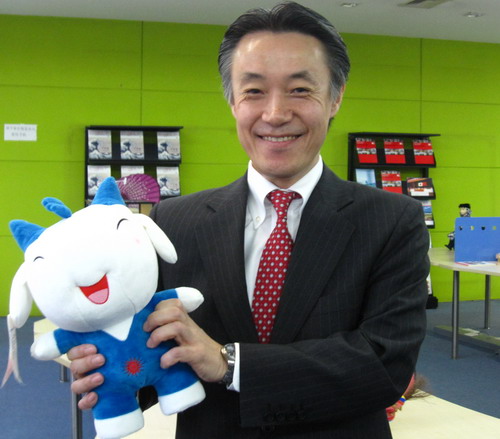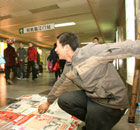News
Asian Game Special: Japan and China create ties through sporting exchanges
Updated: 2010-03-12 10:56
 |
Large Medium Small |

The performance between Chinese President Hu Jintao and Japanese table tennis player Ai Fukuhara in Tokyo served to highlight the role sport can play in exchanges between the two countries particularly among the youth.
Shigeo Yamada, minister of public relations, press, culture, education and sports, has been involved in youth exchanges.
In 2009 the Japanese and Chinese governments jointly arranged 4,000 youth exchanges, with 3,000 of them for high school students. They plan to continue this program annually.
Last year, the Chinese high school basketball team, a squad of about 20 players, went to Kyoto to play against Japanese high school students. “This year, we plan to organize a Japanese basketball team to come to China,” said Yamada. He believes that sports have a unique power to bring people together even with a language barrier.
“The Asian Games should not only be an occasion for athletes to compete, but it also should be an occasion for the athletes and the spectators to deepen mutual understanding, which is indispensable for building a harmonious Asian community,” he said.
This year’s Asian Games will be the largest ever event with 42 sports events and more than 470 categories.
“I am sure that after ‘Thrilling Games’, all the athletes, volunteers and others involved in organizing the events, as well as spectators, not only those physically at the games but also those who watch the games through media, will feel the same sense of accomplishment that will certainly make everyone in Asia one more step closer to each other,” said Yamada.
With the Vancouver Winter Olympics over, Japanese sports fans’ interest in the Guangzhou Games is growing, the minister said. For example, a major marathon event held in Japan, at the beginning of this month, attracted lots of attention because the race served as one of the selection races for the Asian Games.
Japan has hosted the Asian Games twice before, once in 1958 and again in 1994. In 1958 Japan won the event with an impressive tally of 67 gold, 41 silver and 30 bronze medals.
In 1994 it also did well, ranked 2nd overall with 64 gold, 75 silver and 79 bronze medals.
Recalling the event in 1994, the then 29-year minister was surprised to see very Asian sports like Sepaktakraw (like volleyball played with your feet) and Kabaddi played. He thinks it’s important to promote traditional Asian sports and encourage people to continue playing them. These sports will also be played at Guangzhou along with some new additions. The minister says he is interested in watching the dragon boat racing and roller sports, both new this year.
The minister enjoyed sports in his youth and was in the swimming team and table tennis team when he was at school.
Now, he is a keen runner, and completed the London Marathon in 2000 and 2001 and the Fuji Five Lake Ultra Marathon in Japan in 2004. He’s currently considering entering the Beijing Marathon.
The minister also enjoys hiking to such places as the Great Wall at Simatai and is cajoled into the odd round of golf by his friends.
The weather is not very good for sports at the moment, but he is hoping to get more active when the spring comes.







